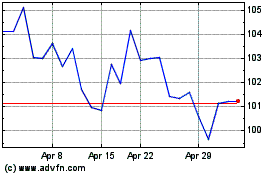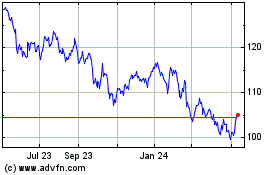Pandemic-Era Shoppers Splurge on Vitamins, Boosting Nestlé Sales -- Update
October 21 2020 - 6:48AM
Dow Jones News
By Saabira Chaudhuri
Nestlé SA said the pandemic has increased consumers' health
consciousness, boosting its small but fast-growing health-sciences
unit and contributing to better-than-expected overall sales at the
world's largest packaged-food maker.
The owner of Nescafe coffee, DiGiorno frozen pizza and Purina
pet food has previously benefited from a pandemic-era shift by
consumers to comfort food -- particularly big, trusted brands -- as
they stocked up and stayed home during lockdowns.
As the pandemic wears on, companies are now getting a boost as
consumers gravitate toward products that boost health, particularly
the immune system.
Nestlé's health-science business has been one of its
lesser-known divisions for years, but Chief Executive Mark
Schneider, a former health-care executive who took the reins in
2017, has turned it into a focus area amid a wide-ranging portfolio
shake-up. The unit represents only about 3% of Nestlé's overall
sales, but Mr. Schneider said Wednesday he wanted it to become "a
health and nutrition powerhouse" through acquisitions and organic
growth.
Nestlé said the unit delivered double-digit sales growth in the
first nine months of the year, but didn't detail its performance
any further in a sales update released Wednesday.
Demand for vitamins, minerals and supplements was strong, the
company said. Supplement brands Garden of Life and Pure
Encapsulations sold particularly well online. So called
healthy-aging products grew at a double-digit rate in the
nine-month period, Nestlé said, with help from Boost, a nutritional
drink brand, in North America and Nutren, a line of nutritional
supplements, in Brazil.
Health-science sales lifted overall revenue, which was powered
by strong pet food and coffee sales. Nestlé said organic sales,
which strip out currency fluctuations, acquisitions and
divestitures, grew 3.5% in the first nine months of the year,
beating analysts' estimates of 2.8%. Results were driven almost
entirely by volume growth. The company upgraded its guidance for
the year, saying it now expects organic sales growth of around 3%,
from a prior forecast of between 2% and 3%.
Nestlé shares were largely unchanged in late morning trading in
Europe.
Net sales fell 9.4%, to 61.91 billion Swiss francs, equivalent
to $68.24 billion, dragged down by currency changes and
divestitures. Mr. Schneider has sold a string of assets, including
Nestlé's skin-health arm and U.S. ice-cream business, as he pivots
toward categories he sees as higher growth.
Other companies have reported sales boosts amid a shift in
health consciousness by consumers.
Conagra Brands Inc. says its Healthy Choice frozen meals are on
the rise. Reckitt Benckiser Group PLC this week said its Airborne
brand, a supplement advertised as boosting the immune system, more
than doubled revenue in the third quarter.
Others have moved to take advantage of the increased concern
about health during the pandemic. Unilever PLC has doubled the
amount of zinc that goes in its Horlicks brand, a malted milk
bestseller in India, and is marketing what it says are the brand's
immunity-boosting benefits.
Nestlé has a head start, having set up the health-science
business in 2011 under former CEO Paul Bulcke, now the company's
chairman. His vision was to use specialist food-based products to
help prevent and treat conditions such as Alzheimer's disease,
diabetes and heart disease. Nestle has also been investing in
treatments and medicine.
It has made a long string of acquisitions to bolster the unit,
earlier this month closing a deal to buy a California-based
biopharmaceutical company that has won approval for the first
treatment for peanut allergies. The acquisition valued Aimmune
Therapeutics Inc. at $2.6 billion, including debt, and analysts
expect Nestle to keep doing big deals.
This year, Nestlé bought a gastrointestinal medication brand and
took a majority stake in a company that makes collagen
supplements.
Still, for all the focus on it, the health-science arm remains
far smaller than older units such as coffee and petcare, which
remained the main drivers of Nestlé's strong sales for the period.
Pet food, where sales rose 4.1% in the nine months, has performed
well for years.
The company said its dairy and cooking-aids arms also did well.
Confectionery and bottled water dragged down the results, with both
categories heavily dependent on tourism and shoppers being out and
about.
After lifting lockdowns, many countries -- particularly in
Europe -- are now implementing strict bans on movement again to
stem the spread of the virus. Nestle said the out-of-home sales
channel overall "remained significantly negative," but sales
declines moderated in the third quarter.
Write to Saabira Chaudhuri at saabira.chaudhuri@wsj.com
(END) Dow Jones Newswires
October 21, 2020 06:33 ET (10:33 GMT)
Copyright (c) 2020 Dow Jones & Company, Inc.
Nestle (PK) (USOTC:NSRGY)
Historical Stock Chart
From Aug 2024 to Sep 2024

Nestle (PK) (USOTC:NSRGY)
Historical Stock Chart
From Sep 2023 to Sep 2024
